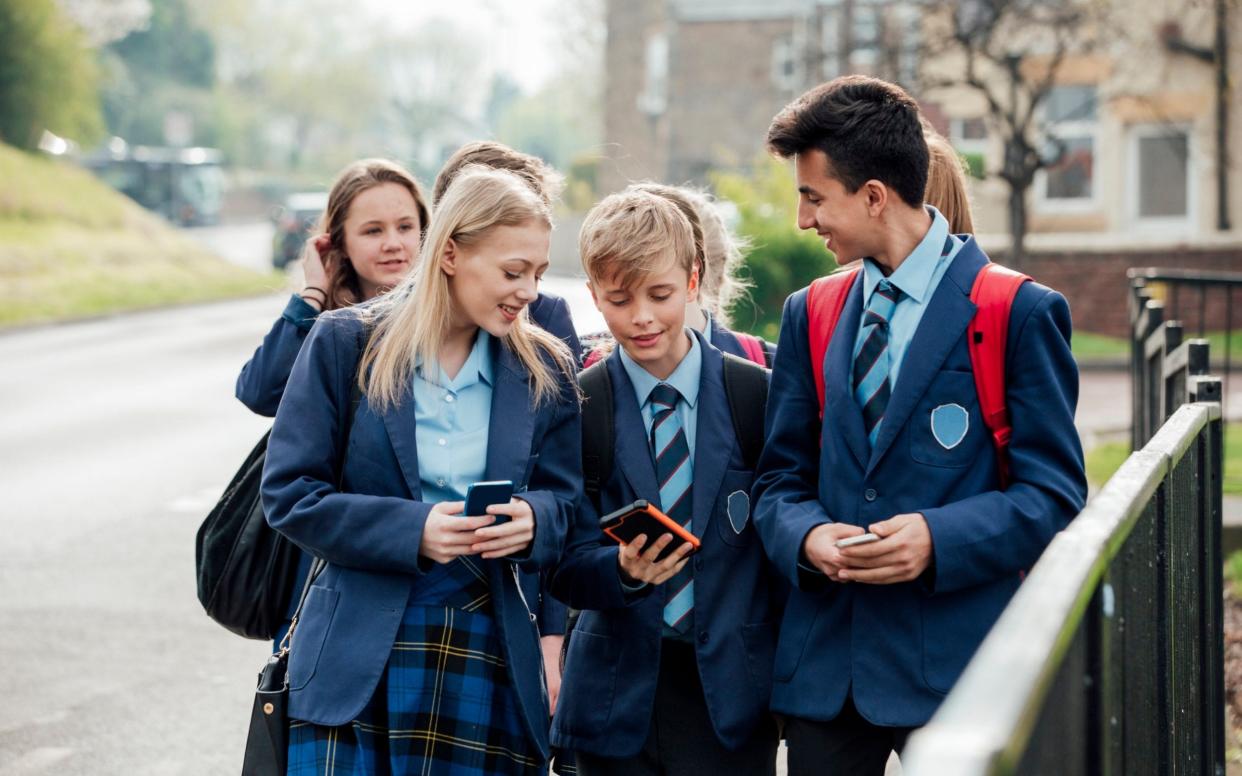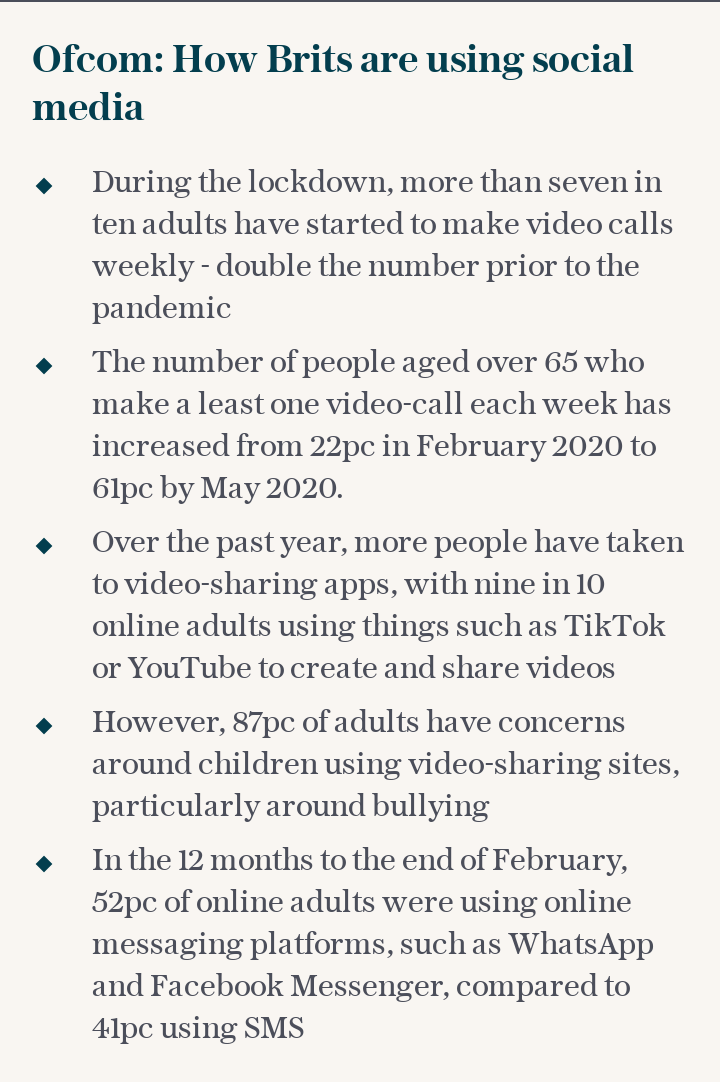Social media scavenger hunts are leading teenagers astray

A new trend is gathering pace among teens since lockdown: social media scavenger hunts. These are not harmless competitions between friends to amass largely useless everyday items. Instead lockdown hunts are a collection of dares, drawn up into lists and shared across platforms such as TikTok and WhatsApp, sometimes between strangers.
The craze stretches from independent schools to state, Brighton to London and even Sydney, Australia. And the one essential element is that the object of the hunt - the dare or challenge - is illegal, dangerous, revolting or cruel.
At Durham University, one social media group called ‘Durham Boys Making All the Noise’ was recently exposed online, containing, among other things, talk of a competition to have sex with the ‘poorest girl’ on campus. As a result, a student has lost his place at the University.
In Australia, final year students at Shore, an exclusive boys’ secondary school in Sydney, created the “The Triwizard Shorenament,” as an end-of-year ‘celebration,’ in which boys would form teams and complete challenges, each requiring photographic or video evidence and worth a varying number of points. Many of these breached criminal laws; others – some of which included intimate acts with females - were just plain distasteful.
And despite the planned challenges being rightly condemned for their sexist and misogynistic content, it seems that female students are not immune to the idea of participating in such events: at another exclusive Sydney school, Pymble Ladies’ College, students have concocted end of year challenges ranging from ‘streak (run naked) across the highway’ and ‘eat someone else’s vomit,’ to ‘ring parents and explain in depth how you lost your virginity’.
The trend seems to have escalated from fairly harmless entertainment.
“I think it started on (video-sharing social media platform) TikTok,” said one 15-year-old I spoke to. “When lockdown first began, there were a number of challenges that users could participate in, but most of them were just about connecting and having fun – like the handwashing challenge. Virtual scavenger hunts also became popular, but they were mostly about collecting photos, such as ‘a selfie with a 9-pack of toilet roll’ or ‘something blue.’”
At some point - perhaps after a group of teens recorded their discovery of human remains in a suitcase while ‘randonauting’ (using coordinates randomly generated by an app to explore unknown locations in your general vicinity) in Seattle in June – the challenges began to get more extreme.
there’s an app called “randonauting” , that sends you to a certain location near you or far from you. But you have to manfiest what your intentions are to see/find before it sends you to the location. Anything can happen, you can find something or walk in the middle of something
— Shaun G (@ShaunGalliano) September 27, 2020
“I think there was definitely a shock-value element that started to come into it,” says Alice*, a year 11 student at a South London comprehensive. “The group who found the body had a huge number of views before the video was taken down; I think other people started to realise that they could attract attention with outrageous content.”
Even as lockdown eased, UK teens were still largely restricted in terms of what they could do and who they could mingle with.
“The more you clamp down on kids, the more they’re going to find a way to have fun in spite of that,” shrugs one 16-year-old. “Rules and restrictions were bad enough even before the pandemic. Now, it’s beyond ridiculous. We’re missing out on what’s supposed to be the best time of our lives.”
Shocking, explicit and profane
Over the summer holidays, students – both in the UK and elsewhere - began to set increasingly high bars for their scavenger hunts. The more shocking, explicit or profane the challenges became, the more they were removed from TikTok. Teens responded by setting up WhatsApp groups to dare each other and keep track of their ‘results’ by way of photographic evidence.
And as disturbing as some of the dares on TikTok were, the ones doing the rounds in closed groups are even more mind-boggling, largely involving drugs, alcohol, sexual activity and vandalism.
“I had to snog four guys in one night,” says a South-coast based 14-year-old girl. “I don’t think I would have usually been okay with it, but earlier that night I’d also had to drink 3 shots of vodka in 10 minutes and ride around a carpark in a shopping trolley. It’s embarrassing, but everyone is doing it.”
The potential for social media to foster ‘challenge’ activity was ripe even before the pandemic took hold.
“These scavenger hunts are, in essence, not so different from widely circulated challenges on social media like the ‘Ice Bucket Challenge’ or the ‘No Make-Up Selfie,’” says Will Gardner, OBE, CEO of Childnet and Director of the UK Safer Internet Centre. “The danger is when the behaviour that’s encouraged is anti-social, potentially dangerous or harmful - and sometimes we need to work with young people to make sure that they are able to manage challenges such as these.”
FDA issues a warning against Benadryl TikTok challenge.https://t.co/oilXIHAurb pic.twitter.com/xzOJDTddnw
— Pharmafocus (@Pharmafocus) September 28, 2020
Teen challenge behaviours have long existed, whether by way of ‘Truth or Dare’ or ‘Spin the Bottle’ - but these were largely finite activities, in that they existed for the course of one party, or one gathering, with a few shreds of gossip that lingered beyond. Now, there is no finite time and place, because phones are omnipresent: in hands, pockets, bags and rooms at all times.
And this, according to psychotherapist Nicholas Rose, is part of the problem.
“The impulse towards this kind of competition is very much connected to its immediacy,” Rose says. “As we develop and mature, we learn more about our impulses and how to manage them, whereas young people are more susceptible to being swept up and ‘gripped’ by a sense of urgency. When that’s coming from several directions - peers online and peers in your immediate presence - it can be very hard to step back and press the pause button.
“Scientists say that, generally, a person’s brain is not fully wired to consider consequences until they’re in their twenties, which is often why younger people are rebellious. And at the moment, there’s all of this anger and uncertainty around rules and the changes we’re all experiencing, so I think it feeds into that, too - difficult and abusive behaviours are being exacerbated by feelings of frustration and powerlessness.”
Indeed, it’s important to realise that these are abusive situations - not only in terms of the person or people on whom the dare is enacted, but among the ‘friends’ egging each other on - a situation that’s outlined in the Henry Joost and Ariel Schulman film ‘Nerve.’
In it, a teen taunted by a friend about her usual reticence embarks on a fictional live-streamed game of ‘dare’ that swiftly gets out of control; despite being made in 2016, it appears to currently be enjoying a second surge of popularity on Amazon Prime and even seems to have inspired a dare-based game app, Double Dog, where users win money by videoing themselves performing dares.
#DARE Crack 12 real, raw eggs on your head as fast as you can in a video. #WeDareYou to attempt the same! (User only had 6 eggs) #DoubleDog pic.twitter.com/Vkg5PW81cr
— Double Dog (@DoubleDogApp) April 10, 2017
Although the Covid-19 rules in Sydney limit public gatherings to groups of twenty, the ‘Shorenament’ rules specified that the boys were to operate in groups of five or six – and, according to UK students, these are the group sizes they were gravitating towards even before the ‘Rule of Six’ came into effect a few weeks ago.
“People are less suspicious of what you’re up to when you’re in a relatively small group,” says 15-year-old Arthur*. “The Rule of Six works fine for the scavenger hunts.”
Arthur attends a private school in London, where fees are in the region of £40,000 a year – and, like the students in Sydney, it seems that an elite education is no barrier to distasteful behaviour.
“If anything, the stakes are higher,” he says. “We, and other private schools, have nicer grounds – and long-standing rivalries.” He mentions urinating and defecating on sports pitches, ‘kidnapping’ and humiliating rival students, often using their school ties as a bind or gag. Shoplifting, buying alcohol and using drugs such as ‘ket’ (ketamine) and ‘nang’ (nitrous oxide) are also ‘point scorers.’
“We’re not able to have parties or sneak into clubs, or any of the things that we would usually be doing at this age,” says Alice. “I think the combination of the restrictions and the fact that we all use social media so much anyway... these challenges just give us a focus and an outlet. People in pubs play drinking games, don’t they? Well, for now, we’ve got this.”
Advice for parents and carers
According to Nicholas Rose, it’s important that parents and children have frank conversations about access to technology. “There’s also a need for discussions with children about how to manage situations that they’re not entirely comfortable with; how to take a step back and give themselves a moment to think before hitting a literal or figurative button. These situations challenge boundaries and it’s important to know how to say ‘no’ and how to avoid acting under pressure.”
He points also to the abusive element of being pressured to do something, and to do it quickly. “It’s important that young people feel comfortable and supported by the people they spend their time with - not under constant pressure,” he says. “Parents can encourage young people to see that when someone is pressuring you, it is not about you - it’s about them. That can be very hard, depending on the relationship with these other people, and how you regard them - but if they are pushing you to do something, then that means that there is something going on for them - and it’s okay for you to say ‘no.’”
Equally, there are ways of encouraging youngsters to harness the power of social media and its ability to foster online interaction and competition for good, says Will Gardner. “Boredom can give rise to risk-taking behaviour, both online and offline - but there are many ways that it can be positive, too. For instance, thanks to technology, young people have endless opportunities for capturing images: we ran a film contest and had some extraordinary entries from young people. Social media also gives young people a voice, giving them opportunities to project their opinions and ideas.”


